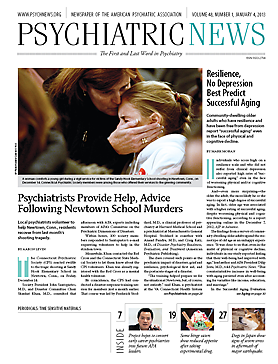Emotional problems can interfere with academic progress and temporarily derail a student’s college career. Dropping out is also problematic for college administrators, who want to keep classroom seats filled and graduation rates high.
However, students who first develop symptoms of depression during their early years in college have a higher risk of discontinuing their education than other students—even those who were diagnosed in high school and were already in treatment, according to a study by epidemiologist Amelia Arria, Ph.D., director of the Center on Young Health and Development in the University of Maryland School of Public Health, and colleagues. Their report was published online December 3, 2012, in Psychiatric Services in Advance.
Most prior studies have focused on college graduation rates, but dropping out for one or more semesters is a much more subtle outcome, wrote Arria and colleagues.
“A student’s struggles with emotional problems will have an impact on academic success,” commented Victor Schwartz, M.D., medical director of the Jed Foundation and co-editor of Mental Health Care in the College Community (Wiley 2010), in an interview with Psychiatric News. Schwartz was not involved with the present study, although he has collaborated with Arria in the past. “It’s important to watch the transition points, like the transition from high school to college, and provide support by continuing or adjusting treatment, if needed.”
The study’s findings suggest that “depressive symptoms—but not necessarily depressive disorders—predict increased risk of college noncompletion,” said the researchers. Dropping out of college in the first year or two thus is not always due solely to difficulties adjusting to a new learning environment.
Arria and colleagues used data from the College Life Study, an ongoing investigation of students who arrived at the University of Maryland as freshman beginning in 2004. The final sample covered 1,145 young people who completed assessments in year 3 or 4 of the study.
By year 4, 14 percent of the students had been diagnosed with depression, 13 percent with anxiety, and 10 percent with attention-deficit/hyperactivity disorder (ADHD). Rates of diagnosis before and during college were roughly similar for the three disorders. A depression diagnosis made while in college was associated with twice the increased risk of discontinuation of the student’s college career. Freshmen with high levels of depressive symptoms were at increased risk of dropping out for one or more semesters during their freshman or sophomore years.
However, said the authors, “students entering college with a prior diagnosis of depression, anxiety, or ADHD were not at increased risk of interruptions in enrollment over four years.”
“Students who are diagnosed early, get into treatment and are symptomatically stable will do as well as their classmates,” said Schwartz. “It’s not the diagnosis but the extent to which the person is symptomatic.”
Each one-point increase in the Beck Depression Inventory score increased risk by 7 percent for dropping out during the first two years. Cannabis-use frequency and number of alcoholic drinks per drinking day predicted discontinuity in the junior and senior years.
“This is an important paper because it addresses the interlocking need for both intellectual and emotional tools to succeed in college,” said Schwartz.
“Screening for drug use, heavy drinking, and depressive symptoms, especially during the first year of college, might be useful for identifying students at risk of temporary withdrawal or dropout,” concluded Arria and colleagues.
“Students need to know that treatment helps,” said Schwartz. “They pay a price for stigma, for not seeking help, so that’s a self-defeating strategy. They should take advantage of the resources offered by the college counseling services.” ■
